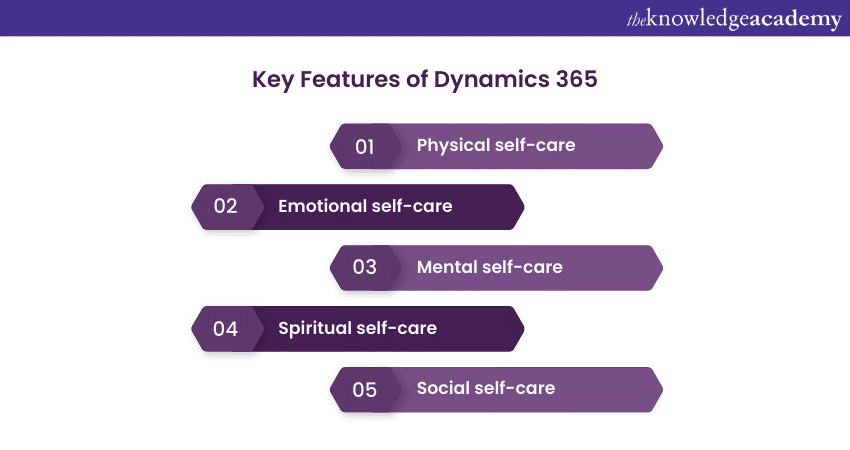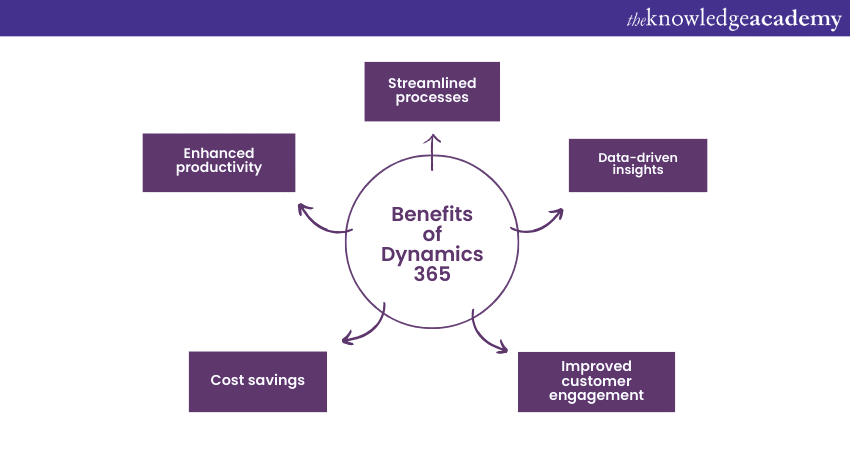We may not have the course you’re looking for. If you enquire or give us a call on 01344203999 and speak to our training experts, we may still be able to help with your training requirements.
We ensure quality, budget-alignment, and timely delivery by our expert instructors.

In today's fast-changing business world, companies seek intelligent tools to manage operations and make customers happy. Microsoft's Dynamics 365 is an excellent package of tools that does just that! Think of it as a super app that boosts productivity and efficiency across the board. With a wide array of Dynamics 365 Features and Benefits, one can streamline operations and enhance productivity.
According to Microsoft, Dynamics products and cloud services revenue witnessed a 19% rise (a 24% increase in constant currency), primarily propelled by a 31% expansion (a 36% surge in constant currency) in Dynamics 365 revenue. This blog will dive into the standout Dynamics 365 Features, showcasing how tools like Microsoft Dynamics 365 Field Service can revolutionise your business operations.
Table of Contents
1) What is Dynamics 365?
2) Key Features of Dynamics 365
a) Customer Relationship Management (CRM)
b) Enterprise Resource Planning (ERP)
c) Unified platform
d) Scalability and customisation
e) Cloud-based accessibility
3) Benefits of Dynamics 365
4) Is Dynamics 365 a Good Fit for Your Business?
5) Conclusion
What is Dynamics 365?
Dynamics 365 is a collection of powerful software applications created by Microsoft to help businesses manage various aspects of their operations more efficiently. It's like a toolkit that includes different tools for tasks like keeping customers satisfied, planning resources, and analysing data. These tools are split into smaller apps that can work independently or together as needed.
So, whether a business wants to handle customer relationships better, organise finances, or improve how things flow in the company, Dynamics 365 offers solutions to make it all happen smoothly. It's like having an intelligent helper that understands what businesses need to succeed.
Key features of Dynamics 365
The Dynamics 365 Features are the building blocks that make it a powerful and versatile solution for businesses. Let's explore each of these features in detail:

Customer Relationship Management (CRM)
At the core of Dynamics 365's functionalities lies Customer Relationship Management. This involves overseeing customer interactions and connections, aiming to enhance contentment and allegiance. Here's an overview of the features encompassed within CRM:
a) Sales Management:
The sales module of Dynamics 365 assists sales teams in overseeing the complete sales procedure. It covers everything from generating potential leads to finalising agreements, it furnishes utilities for monitoring customer engagements, handling contacts, and predicting sales outcomes. Sales professionals have the capability to give precedence to leads, systematise repetitive duties, and gain a deeper understanding of the status of their sales pipeline.
b) Marketing Automation
The marketing module assists in creating and executing marketing campaigns. It includes tools for email marketing, social media, and lead nurturing. Dividing your audience into segments enables you to customise content, personalise your communication, and track the success of your campaigns, all of which aim to refine your strategies.
c) Customer service
This module empowers customer support teams to provide exceptional service. Case management tools allow agents to track and resolve customer inquiries efficiently. The system captures a history of customer interactions, enabling agents to provide personalised and effective assistance.
Ace your interview with our expert guide on "Dynamic 365 Interview Questions and Answers"! Get key insights and boost your confidence. Click here to start preparing today!
Enterprise Resource Planning (ERP)
Enterprise Resource Planning in Dynamics 365 focuses on optimising internal processes. It covers various aspects of business operations:
a) Financial Management:
The financial module handles accounting, budgeting, and financial reporting. It helps businesses manage their finances, track income and expenses, and ensure compliance with accounting standards. Features include ledger management, invoicing, and financial analysis.
b) Supply Chain Management:
supply chain management tools streamline the flow of goods and services. The module helps optimise inventory levels, reduce lead times, and collaborate effectively with suppliers from procurement to distribution. It also assists in demand forecasting and order fulfilment.
c) Human Resources (HR):
The HR module supports Personnel Management tasks. It covers employee records, benefits administration, payroll processing, and performance evaluations. It helps businesses keep track of their workforce, ensure compliance, and enhance employee satisfaction.
Unlock the power of customer relationships with our Microsoft Dynamics 365 Fundamentals (CRM) MB910 Course – Sign up now!
Unified platform
Dynamics 365's unified platform brings applications together for seamless operation:
a) Data Sharing:
With a shared database, data entered in one module can be used across others. For instance, customer data from the CRM module can be used in the ERP module for accurate invoicing and financial analysis.
b) Collaboration:
Departments can collaborate effectively because they're working within the same ecosystem. The availability of shared data enhances communication and coordination among the sales, finance, and customer service departments.
c) Centralised Management:
Administrators can manage user access, security settings, and application configurations from a single interface. This simplifies administration and ensures consistency in user permissions.
Streamline your operations and boost productivity with Dynamics 365 Business Central – the ultimate tool for business success!
Scalability and customisation
Dynamics 365's flexibility makes it suitable for businesses of varying sizes and industries:
a) Modular Approach:
Organisations can start with the applications they need immediately and add more as they grow. This prevents them from paying for unnecessary features, promoting cost-effectiveness.
b) Customisation:
Dynamics 365 can be tailored to align with specific business processes. Custom fields, workflows, and automation rules can be configured without extensive coding, adapting the system to unique needs.
Simplify operations with seamless Dynamics 365 Implementation – empower your team and maximise ROI effortlessly.
Cloud-based accessibility
Dynamics 365 operates in the cloud, offering a range of benefits:
a) Remote Access:
Users can access the system from anywhere with an internet connection. This promotes remote work and facilitates collaboration between teams working from different locations.
b) Automatic Updates:
Microsoft manages system updates and maintenance in the cloud. This guarantees that companies consistently possess the most up-to-date features, solutions to glitches, and security improvements, all without the inconvenience of manual updates.
c) Scalability:
Cloud infrastructure allows businesses to scale up or down based on changing requirements easily. This elasticity ensures that businesses pay only for the resources they need at any given time.
Unlock the power of Microsoft Dynamics 365 with our comprehensive Introduction To Microsoft Dynamics 365 55250A Training – Join now!
Benefits of Dynamics 365
Dynamics 365 offers enhanced productivity, streamlined processes, data-driven insights, improved customer engagement, and potential cost savings. Its flexible design adapts to evolving business needs.

Enhanced Productivity
Dynamics 365 offers tools that automate routine tasks and provide a unified platform, leading to improved productivity:
a) Time Savings:
Automation reduces manual data entry and repetitive tasks. Sales representatives can focus on building relationships instead of managing spreadsheets, boosting their efficiency.
b) Integrated Workspace:
Allowing employees to work within a unified environment means they don't need to switch between different applications. This seamless experience enhances productivity and reduces cognitive load.
Streamlined Processes
The integration of CRM and ERP functionalities results in streamlined operations and improved efficiency:
a) End-to-end View:
Having access to data across departments provides a holistic view of processes. For instance, sales can see the status of orders, allowing for quicker responses to customer inquiries.
b) Reduced Errors:
Centralised data reduces the risk of errors caused by duplicate data entry or conflicting information. This ensures accuracy in financial records, customer interactions, and order processing.
Data-Driven insights
Dynamics 365 helps businesses to make informed decisions through powerful analytics and reporting tools:
a) Real-time Analytics:
Dynamic reports and dashboards offer real-time insights into various aspects of the business, such as sales performance, customer behaviour, and financial health.
b) Predictive Analytics:
Machine learning capabilities within Dynamics 365 enable businesses to predict trends and outcomes based on historical data. This helps in proactive planning and decision-making.
Improved Customer Engagement
Dynamics 365's CRM capabilities contribute to better customer engagement and relationships:
a) Personalised Interactions:
With access to a 360-degree view of customer interactions, businesses can tailor their communication to individual preferences and needs, enhancing customer satisfaction.
b) Consistent Experience:
Whether a customer interacts with sales, customer service, or marketing, the unified platform ensures that they receive a consistent and coherent experience across touchpoints.
Cost Savings
Dynamics 365 brings cost savings through various avenues:
a) Reduced IT Infrastructure:
Being a cloud-based solution reduces the need for hardware and maintenance. This translates to lower costs in terms of server maintenance and infrastructure investments.
b) Scalable Pricing:
Dynamics 365's modular structure allows businesses to select the applications they need. This avoids paying for unnecessary features optimising costs based on requirements.
c) Automation Efficiency:
Automating tasks reduces the need for manual labour and increases operational efficiency, leading to potential cost savings.
Looking for Dynamics 365 jobs? Find the best opportunities and start applying
Is Dynamics 365 a Good Fit for Your Business?
Many businesses can benefit significantly from Dynamics 365. Microsoft's cloud-based business solutions platform, Dynamics 365, combines personnel management, operations, financials, CRM, ERP, and more on a single, integrated platform. But whether it's the best option for you will depend on your business's unique requirements and situation. Here are some considerable points:
a) Scalability and Flexibility: Dynamics 365 offers scalable solutions that small and large companies can effectively utilise. Its extensive toolkit can help simplify operations, particularly for companies witnessing rapid growth or dealing with complex processes.
b) Integration requirements: Dynamics 365 connects well with other Microsoft products, which can increase productivity and data consistency if your company employs them.
c) Industry Requirements: Dynamics 365 offers customised solutions for various industries, such as manufacturing, banking, and retail. It can be a good fit if you require characteristics unique to your industry.
d) Customisation: If the platform offers much room for customisation, you can modify the software to meet your specific business operations.
e) Budget: Despite its vast capability, dynamics 365 can be costly, particularly for smaller enterprises. Analyse your spending and weigh the advantages the software offers against it.
f) User Adoption and Support: It's crucial to consider the learning curve of a new system and your team's ability to adapt to it. Dynamics 365 offers a lot of potential, and investing in support and training can significantly ease the transition.
Unlock the full potential of Dynamics 365 with our comprehensive Microsoft Dynamics 365 Training – supercharge your business today!
Conclusion
Microsoft Office presents a transformative solution with Dynamic 365 Features and Benefits, including Dynamics 365 for Finance and Operations, for modern businesses. Integrating CRM and ERP functionalities, fostering collaboration, and providing data-driven insights empowers organisations to enhance Customer Experiences, streamline operations, and make informed decisions. Embracing Dynamics 365 equips businesses with the dynamic tools they need to thrive in today's changing landscape. Unlock the Power of Dynamics 365:
Unlock the Power of Dynamics 365: Join our Microsoft Dynamics 365 Fundamentals (ERP) MB920 Course today and embark on a journey to master the dynamic essentials of modern business management.
Frequently Asked Questions
Is Dynamics 365 a CRM or ERP?

Microsoft Dynamics 365 is a combined suite of Enterprise Resource Planning (ERP) and Customer Relationship Management (CRM) applications offered by Microsoft. It combines various functions, including sales, customer service, field service, operations, finance, marketing, and project service automation into a single platform.
What are the Dynamics 365 modules?

Dynamics 365 offers a range of modules, including sales, customer service, finance, supply chain management, marketing, and Human Resources. Each module is designed to streamline specific business functions and integrate seamlessly with other modules
What are the Other Resources and Offers Provided by The Knowledge Academy?

The Knowledge Academy takes global learning to new heights, offering over 30,000 online courses across 490+ locations in 220 countries. This expansive reach ensures accessibility and convenience for learners worldwide.
Alongside our diverse Online Course Catalogue, encompassing 19 major categories, we go the extra mile by providing a plethora of free educational Online Resources like News updates, Blogs, videos, webinars, and interview questions. Tailoring learning experiences further, professionals can maximise value with customisable Course Bundles of TKA.
What is The Knowledge Pass, and How Does it Work?

The Knowledge Academy’s Knowledge Pass, a prepaid voucher, adds another layer of flexibility, allowing course bookings over a 12-month period. Join us on a journey wherez education knows no bounds.
What are the Related Courses and Blogs Provided by The Knowledge Academy?

The Knowledge Academy offers various Microsoft Dynamics 365 Training, including the Microsoft Office 365 Training, Microsoft PowerPoint Training and Microsoft SharePoint Training. These courses cater to different skill levels and provide comprehensive insights into Sharepoint Developer Job Description.
Our Microsoft Technical Blogs cover a range of topics related to Microsoft Dynamics 365 Training, offering valuable resources, best practices, and industry insights. Whether you are a beginner or looking to advance your Microsoft Dynamics 365 Skills, The Knowledge Academy's diverse courses and informative blogs have got you covered.
Upcoming Microsoft Technical Resources Batches & Dates
Date
 Retired : Microsoft Dynamics 365 Core Finance and Operations MB300
Retired : Microsoft Dynamics 365 Core Finance and Operations MB300






 Top Rated Course
Top Rated Course



 If you wish to make any changes to your course, please
If you wish to make any changes to your course, please


